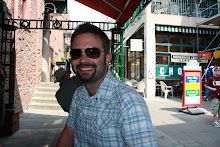
Saturday, with Slow Food Nation waking up along the San Francisco waterfront, I was on assignment for the good people at Foodbuzz. I had two workshops to cover that day, so I hit Fort Mason armed with a voice recorder, digital camera, and a clean palate. My first stop was the Presidum Coffee Cupping Workshop, which promised to tease my tastebuds with amazing coffees from exotic locations brewed with scientific attention to detail.
As the speakers discussed the process of "coffee cupping", a method of tasting coffee similar to wine tasting, we were introduced to two distinct coffees from the regions of Sierra Cafetalera in Dominican Republic and Huehuetenango in Guatemala. Farmers from these two regions each took a moment to tell their story, talk about their coffee and their farms, and the struggles they have faced getting their coffee produced and put on the market. Through Slow Food and the Italian government, these coffee farmers have received help developing their farms in ways that guarantee social and environmental sustainability and highest quality taste in their final product.
These Presidiums were developed to help these small, rural communities not only improve their standard of living, but strengthen the production process, promote the products, and establish sustainable coffee cultivation. These small farms were chosen by the presidiums for the high quality of coffee beans they grow at altitudes above 1500 feet. The essential key to the partnership between Slow Food and these small family farms is developing sustainable farming practices that not only help ensure the ongoing health of the land, but the higher quality of life for these poor rural farmers.
The coffee these farmers produce is spectacular; the difference between this coffee and the brown water you purchase at your corner Starbucks is like night and day. It is full of robust, interesting flavors that taste nothing like your average morning coffee. These coffees were light, slightly acidic, tasting of chocolate and citrus fruits.
While I always try to purchase sustainably grown, "Fair Trade" coffees, what I will take away from this workshop is to look harder to find those high quality coffees grown by small, family farms and cooperatives that will help develop these communities and promote sustainable farming. So next time you brew a pot or stop by your neighborhood coffee house, think about where that cup came from: who picked the beans, who washed and dried them, bagged them and loaded them into a truck to travel thousands of miles to end up in your hands. And don't forget to enjoy your coffee.
Tuesday, September 2, 2008
Assignment Slow Food Nation: Presidium Coffee Cupping Taste Workshop
Posted by Joel at 8:51 PM
Labels: coffee, Dominican Republic, Guatemala, Slow Food Nation
Subscribe to:
Post Comments (Atom)












0 comments:
Post a Comment